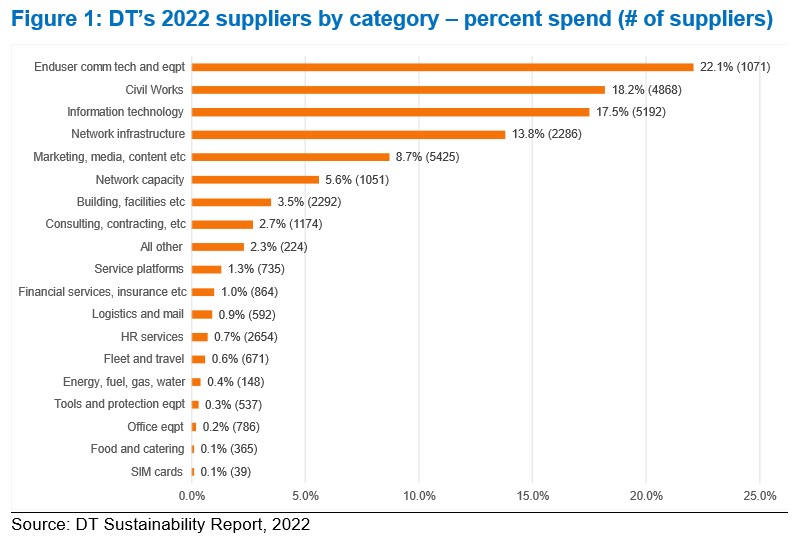By Matt Walker
This brief report addresses telco procurement in the context of the rising importance of environmental sustainability. It discusses how telcos are tracking the greenness of their external spend and placing more importance on vendors’ environmental credentials. Telcos increasingly focus on suppliers’ compliance with the Science-Based Targets initiative (SBTi), audits conducted by the Joint Alliance for CSR (JAC), environmental ratings from EcoVadis, participation in the CDP Supply Chain Program, and emissions data compliant with the GHG Protocol.
A typical big telco has thousands of suppliers, across hundreds of categories of products and services. DT had >25,000 in 2022, for instance, while the much smaller Singtel still had well over 5,000. When telcos assess their carbon footprint, the vast majority come from this supply chain; Scope 3 (indirect, value chain) greenhouse gas emissions are usually 70-90% or more of total emissions; 77% for Telenor, and 85% for Deutsche Telekom, for instance. The primary driver of telcos’ Scope 3 footprint is “purchased goods and services”, in particular purchased technology. That means telcos need to push on the supply chain if they want to reduce their carbon footprint. They are starting to do so. Much of the pressure is informal, through working groups and on-site collaborations. Most telcos have their own company-specific processes and rules related to green procurement; these guide the oversight process in many regions. But telcos are increasingly relying on hard numbers vetted by third parties to guide their procurement. Telcos are focused on how many of their suppliers (1) have approved climate change plans with the SBTi; (2) use the CDP Supply Chain program’s system for reporting data; (3) have been audited under the Joint Alliance for CSR; and, (4) have EcoVadis sustainability assessments. The new IFRS creation, the International Sustainability Standards Board, will likely gain importance as it evolves. There are other relevant groups and standards, and they can vary regionally, especially in the US, China, Japan, and the EU. Vendors who aggressively implement credible climate change action plans, and report rapidly declining GHG emissions, will have an advantage in winning telco business in the future.
- Table Of Contents
- Figures and Tables
- Coverage
- Visuals
Table Of Contents
Table Of Contents
- Summary – page 2
- Vendors need green credentials to win telco business – page 2
- Reporting frameworks are still evolving – page 2
- Telcos have 1000s of suppliers but tech vendors drive Scope 3 emissions – page 3
- Telcos recognize climate change threat, addressing with suppliers – page 4
- Key organizations and standards facilitating action on climate change – page 4
- How will telcos consider suppliers’ green credentials in procurement? – page 7
- What should vendors do? – page 7
- Appendix – page 10
Figures and Tables
Figures and Tables
Table 1: Key organizations in sustainability reporting
Figure 1: DT’s 2022 suppliers by category – percent spend (# of suppliers)
Coverage
Coverage
Companies mentioned:
Accenture
Airtel
America Movil
AT&T
BT
China Mobile
Deutsche Telekom
Ericsson
Huawei
KPN
Microsoft
MTN Group
Nokia
NTT
Oracle
Orange
Singtel
Swisscom
Taiwan Mobile
TDC
Telecom Italia
Telefonica
Telenor
Telstra
T-Mobile
Verizon
Vodafone
Zain
ZTE
Visuals
Visuals


